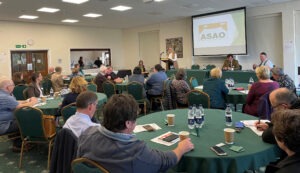Latest News from Bridgend County Borough Council

Behind the scenes at Maesteg Town Hall
Members of Bridgend County Borough Council travelled to Maesteg recently to have a peek behind the scaffolding at Maesteg Town Hall and see how work is progressing on its multi-million pound transformation.
The Leader, Cllr Huw David and Cllr Charles Smith, Cabinet Member for Education and Regeneration, joined Janine Nightingale, the council’s director of Communities, at the Grade II listed building for a look at how it is being restored and enhanced with a new glass atrium, studio theatre, cinema space, café, mezzanine bar, heritage centre and modern library.
With a new natural slate roof installed across the main building, the porch and main entrance steps have been removed to make way for a new stairway and lift which will ensure that the hall is accessible for all.
Inside the main auditorium, 1970s laminate cladding has been stripped off to reveal the building’s original timber wall boards, which are now being repaired, sanded and reinstated to their former glory.
The work has also revealed two ornate cast-iron columns which are being redecorated, while the lowering of the stage to its historic level has uncovered the original timber floorboards, skirting boards and radiators.
In the former market space, workers have uncovered glazed tiles, a previously unknown window, terracotta brick quoins and the original stonework, while up in the clock tower, repairs and redecoration are underway.
Bridgend County Borough Council is working in partnership with Awen Cultural Trust and a number of key funders on the £7.9m project, which is set to secure the future of the historic old building and realise its full potential as a community hub.
Cllr Charles Smith said: “The refurbishment and upgrading of Maesteg Town Hall is on track to become the biggest, most worth-while investment that Maesteg has seen in quite some time.
“Without it, the building would have had to close its doors after a century of use. As well as securing the future of the town hall, this work is going to provide all new community facilities for local people to enjoy.
“I am greatly looking forward to seeing the reaction of local people when the work is finished and the building can reopen its doors.”
Cllr David added: “This project represents the largest investment in arts and culture in Maesteg for generations, delivering state of the art facilities while also protecting and enhancing the rich heritage of the town hall.
“Our partners, Awen Cultural Trust, and our Welsh contractors Knox and Wells have done an excellent job of working safely throughout the coronavirus pandemic, and I am delighted at the strong progress they are continuing to make.”
Due to the pandemic and further restoration work being required on certain features of the building such as the clocktower, the town hall is now scheduled to reopen in Spring 2022.
The £7.9m project is being funded by Bridgend County Borough Council, Welsh Government regeneration funding, the Valleys Task Force, the European Regional Development Fund, Awen Cultural Trust, the National Lottery Heritage Fund, Maesteg Town Council, the Garfield Weston Foundation, the Davies Trust, the Pilgrim Trust, CADW, the Welsh Government’s Community Facilities Programme and its Museums, Archives and Libraries Division.
Update on Covid-19 cases in schools
Bridgend County Borough Council has released new figures on the numbers of pupils and staff who have tested positive for coronavirus.
The latest statistics confirm 37 percent of all schools in the county borough are currently affected by the pandemic.
In total 28 pupils and eight members of staff have tested positive for Covid-19 with 1,413 pupils and 45 staff members currently in self-isolation across 22 schools.
The Cabinet Member for Education, Cllr Charles Smith said: “All schools have a full range of measures in place to reduce risk, limit contact and maintain high standards of hygiene, and unaffected pupils can continue to attend lessons as normal.
“The self-isolations are taking place purely as a precautionary measure and are in line with national advice from Public Health Wales.
“For pupils who are required to self-isolate, virtual classrooms are in place and blended learning techniques, enabling them to continue to participate and benefit from lessons.
“We would urge parents, carers and guardians to support efforts to fight the spread of the coronavirus by remaining vigilant, and remind them of the importance of not sending children to school if they exhibit any symptoms of Covid-19 or have tested positive.”
Council leader addresses national social services conference
The Leader, Cllr Huw David has addressed the social care sector about the future of services in Wales.
Speaking at the National Social Care Digital Conference, Cllr David, who is also Welsh Local Government Association spokesperson for health and social care, told the Association of Directors of Social Services that the Covid-19 pandemic had shone a spotlight on the vital role social care plays in our communities.
He said: “Social care staff have been on the frontline throughout the crisis, doing an incredible job in extremely challenging circumstances to protect those they care for. It has really showcased the commitment, passion and dedication of social care staff up and down the nation, as well as the innovation of people who are directing their own care and support and everyone’s ability to adapt so well and so quickly to an unprecedented situation.”
Cllr David told the conference that inadequate funding is holding the sector back. He said: “The debate around paying for care in Wales is ongoing with the discussions to date focussing on better reward and recognition of the social care workforce – this is essential and fully supported, but there also remains a need to consider how the challenge of the additional demands being placed on social care services at a time of reducing resources can be overcome.
“This underlines the need for a fair and long-term funding settlement for social care to be set out as a priority.”
The council leader said that in the future, social care should be community-based and take a ‘whole-person’ approach, addressing people’s physical health, mental health and social needs together.
He said this approach should not just “be the preserve of social care and support alone” with a need for the right kind of housing to help people remain independent, leisure and recreation facilities to encourage physical activity, safe and inclusive communities to support residents’ mental wellbeing, and reliable transport links and comprehensive employment services to combat loneliness.
Cllr David told the conference, which took place on 19-20 November: “There remains a need for us to preserve a social care system which is led, commissioned and delivered close to local communities, enabling decisions taken about funding to be made with local people, meaning that what is commissioned is what really matters to people.
“The workforce will of course be fundamental to the delivery of this. It is heartening to see social workers and social care workers now being more regularly recognised by all parts of society. But as welcome as claps and offers of free goods and services from retailers are, they are no substitute for proper pay and conditions and a pathway to progress within a professionalised career sector. There must be an ambition and the resources made available pay the Real Living Wage for the whole social care sector as a minimum.”




